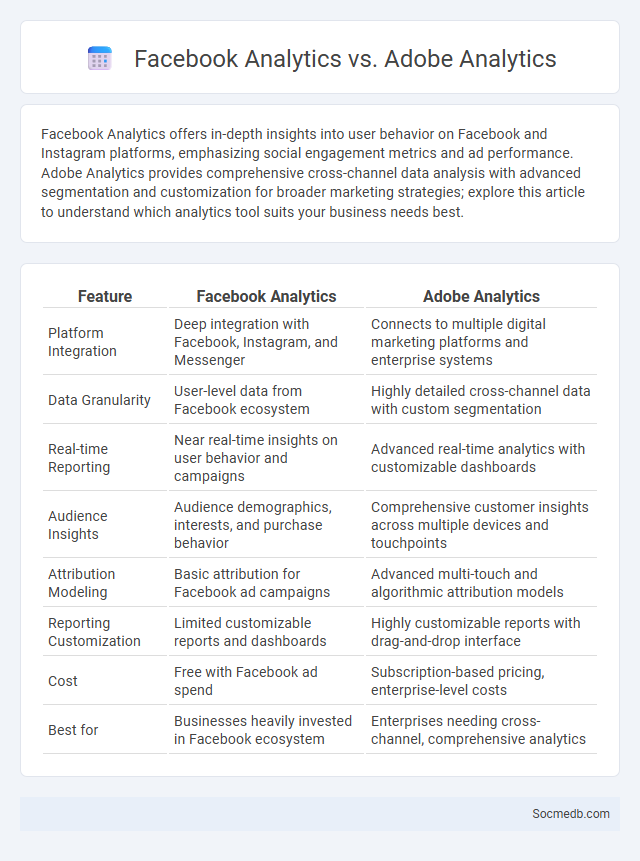
Photo illustration: Facebook Analytics vs Adobe Analytics
Facebook Analytics offers in-depth insights into user behavior on Facebook and Instagram platforms, emphasizing social engagement metrics and ad performance. Adobe Analytics provides comprehensive cross-channel data analysis with advanced segmentation and customization for broader marketing strategies; explore this article to understand which analytics tool suits your business needs best.
Table of Comparison
| Feature | Facebook Analytics | Adobe Analytics |
|---|---|---|
| Platform Integration | Deep integration with Facebook, Instagram, and Messenger | Connects to multiple digital marketing platforms and enterprise systems |
| Data Granularity | User-level data from Facebook ecosystem | Highly detailed cross-channel data with custom segmentation |
| Real-time Reporting | Near real-time insights on user behavior and campaigns | Advanced real-time analytics with customizable dashboards |
| Audience Insights | Audience demographics, interests, and purchase behavior | Comprehensive customer insights across multiple devices and touchpoints |
| Attribution Modeling | Basic attribution for Facebook ad campaigns | Advanced multi-touch and algorithmic attribution models |
| Reporting Customization | Limited customizable reports and dashboards | Highly customizable reports with drag-and-drop interface |
| Cost | Free with Facebook ad spend | Subscription-based pricing, enterprise-level costs |
| Best for | Businesses heavily invested in Facebook ecosystem | Enterprises needing cross-channel, comprehensive analytics |
Introduction to Digital Analytics Tools
Digital analytics tools enable precise tracking and measurement of social media performance by analyzing metrics like engagement rates, click-throughs, and audience demographics. These tools provide actionable insights into user behavior, helping you optimize content strategy and maximize ROI across platforms like Facebook, Instagram, and Twitter. Leveraging analytics dashboards and reporting features ensures data-driven decisions that enhance your brand's visibility and growth.
Overview of Facebook Analytics
Facebook Analytics provided detailed insights into user behavior, engagement patterns, and conversion metrics across Facebook's platforms, allowing businesses to measure campaign effectiveness and optimize marketing strategies. The tool tracked user interactions such as clicks, shares, and video views while offering demographic data and funnel analysis to enhance audience targeting. By integrating data from Facebook Pages, apps, and websites, Facebook Analytics delivered a comprehensive view of customer journeys and performance trends.
Overview of Adobe Analytics
Adobe Analytics provides advanced social media analytics tools enabling businesses to track, measure, and optimize engagement across multiple social platforms. It offers real-time data on audience behavior, sentiment analysis, and campaign performance, integrating with platforms like Facebook, Twitter, and Instagram. Marketers leverage Adobe Analytics to gain actionable insights, improve targeting, and maximize social media ROI through comprehensive reporting and customizable dashboards.
Overview of Google Analytics
Google Analytics offers comprehensive social media tracking, providing detailed insights into user engagement across platforms like Facebook, Twitter, and Instagram. By analyzing referral traffic, conversion paths, and user behavior, you can measure the effectiveness of your social campaigns and optimize your marketing strategy. Understanding these data points helps you make informed decisions to enhance your social media presence and increase ROI.
Core Features Comparison
Social media platforms are distinguished by their core features such as content sharing, user interaction, and multimedia support. Facebook emphasizes community building with features like groups and events, while Instagram focuses on photo and video sharing with Stories and Reels. Twitter prioritizes real-time updates and concise communication through tweets and hashtags, catering to trending topics and news dissemination.
Data Collection and Integration
Social media platforms collect vast amounts of user data, including behavioral patterns, preferences, and interactions, to enhance targeted advertising and personalized content delivery. Advanced data integration techniques combine information from diverse sources such as posts, clicks, likes, and shares, enabling comprehensive user profiles that drive algorithmic decision-making. Effective data integration supports real-time analytics, improving user engagement and optimizing platform performance through cohesive data ecosystems.
Reporting Capabilities and Customization
Social media platforms offer robust reporting capabilities that allow users to track engagement metrics, audience demographics, and content performance in real-time, providing valuable insights for data-driven decision-making. Customization features enable tailored dashboards and automated report generation based on specific KPIs, enhancing the ability to monitor campaign effectiveness across multiple channels. Advanced analytics tools further support segmentation and trend analysis, empowering brands to optimize strategies and maximize ROI.
User Segmentation and Audience Insights
User segmentation in social media leverages demographic, behavioral, and psychographic data to categorize audiences into meaningful groups, enhancing targeted marketing strategies. Audience insights reveal patterns such as engagement rates, content preferences, and platform usage, allowing you to tailor campaigns that resonate with specific segments. Optimizing your social media efforts with precise user segmentation and in-depth audience insights drives higher conversion rates and improves overall ROI.
Pricing and Accessibility
Social media platforms offer a range of pricing options, from free access with basic features to premium subscriptions unlocking advanced tools and analytics. Accessibility varies across devices, with most platforms optimized for smartphones, tablets, and desktops to ensure seamless user experience. You can choose a plan that fits your budget while maintaining full access to essential social media functionalities.
Choosing the Best Analytics Tool for Your Business
Selecting the best social media analytics tool for your business requires evaluating features such as real-time data tracking, engagement metrics, and integration capabilities with various platforms. Tools like Sprout Social, Hootsuite, and Buffer offer comprehensive dashboards that help you measure campaign effectiveness and audience behavior. Ensuring the analytics tool aligns with your specific business goals will maximize your social media strategy's impact and growth potential.
 socmedb.com
socmedb.com